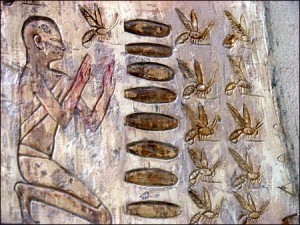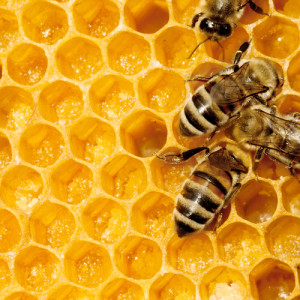 There is never a day that goes by that I don’t use honey. You could say that I am a blissful addict who can tell the difference between the lightness of clover honey, to the complex, rustic taste of honey collected from the pollination of buckwheat.
There is never a day that goes by that I don’t use honey. You could say that I am a blissful addict who can tell the difference between the lightness of clover honey, to the complex, rustic taste of honey collected from the pollination of buckwheat.
Honey is first thing I grab when I make a cup of tea in the morning. It’s my go-to secret weapon of choice when baking Baklava (yes, had to sneak another Greek reference in), and interestingly enough, it’s the only sweetening agent found in those late-night pints of Haagen Dazs ice cream carefully hidden in your freezer.
Honey has been equated throughout history as a nectar of the gods. It was mankind’s first and most widely used sweetener. The consumption of this delicate syrup dates back to 2100 BC where it is mentioned in Sumerian and Babylonian cuneiform writings, the Hittite code, and the sacred inscriptions of Egypt and India. 
The Old Testament of the Bible references the Israelites’ “Promised Land” by calling it “the land of milk and honey.” German peasants in the 11th century even used it as their primary currency and could choose pay their feudal lords in honey or beeswax.
As humans on earth, we have a history of reverence for this delicious commodity. We have all been fascinated by the friendly bee’s work ethics for centuries, and yet, the honeybee population is rapidly declining.
Did you know . . .
honeybees must tap over two million flowers to make one pound of honey, flying a distance equal to more than three times around the world
Nearly one-third of bee colonies perished last winter due to Colony Collapse Disorder, a fungus that completely destroys an entire hive. A new study suggests that swift decline could take a huge economic toll on the agricultural economy, way beyond just simply a decline in honey. The Agriculture Department estimates that insect-pollination directly contributes $20 billion to the U.S. economy every year.
 The loss of honey bees would mean devastation changes to our agricultural system. The same study also suggests that if indirect products, such as milk and beef, which are created by cows that feed on crops that rely on pollination, the economic contribution could potentially increase to $40 billion. So basically, the majority of our FOOD — fruits, vegetables, dairy products and meats could also be irreversibly affected.
The loss of honey bees would mean devastation changes to our agricultural system. The same study also suggests that if indirect products, such as milk and beef, which are created by cows that feed on crops that rely on pollination, the economic contribution could potentially increase to $40 billion. So basically, the majority of our FOOD — fruits, vegetables, dairy products and meats could also be irreversibly affected.
Why is this happening you ask? What could have possibly been the primary cause of Colony Collapse Disorder? There is evidence to suggest that the fungal disease was actually brought on by the agricultural use of pesticides and fungicides commonly used on conventional and genetically modified crops. GMO’s strike again!
This proves yet again how vital the balance of nature is, and how every creature plays its part. Even a tiny little worker bee has a purpose (even if one single bee makes only one-twelfth of a teaspoon of honey during its lifetime). The world around us is precious, and it saddens me to think that the ultimate consequences of mankind’s actions might not be fully realized until it’s too late.
And what is it that you can do to help our friend the honeybee? Cultivate plants that attract bees, write to your senators and representatives in congress on the federal level and ask them to support funding of honeybee research, or even start your own backyard hive. Haagen Dazs and University of California (UC Davis) have a great list of resources to learn more and get active!
I would want my grandchildren to enjoy Haagen Daas ice cream, and Baklava. don’t you?

Pingback: Friday Faves, Is it REALLY August? | Living Simply Free
Pingback: TRANSCEND MEDIA SERVICE » 15 Plants to Help Save Bees